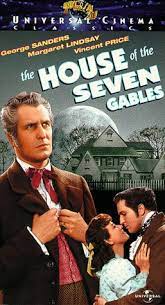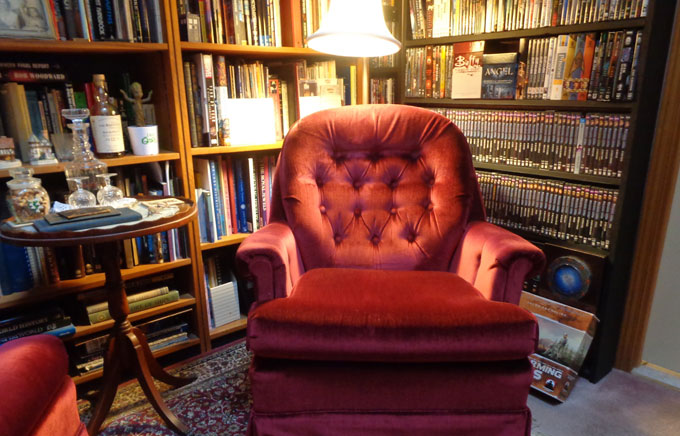
Near the end of the 19th Century, Colonel Jaffrey Pyncheon falsely accused a poor carpenter named Matthew Maule of witchcraft, and he was hanged. Pyncheon took his land and built a luxury home on it, but Maule cursed the Pyncheon family and the Colonel died soon afterwards. For the next 160 years, the family lived there in fear of the Maule Curse.
In the middle of the 19th Century, the Colonel’s great-great grandson, also named Jaffrey Pyncheon (George Sanders), is a young lawyer. His older brother Clifford (Vincent Price) lives at home with their father Gerard (Gilbert Emery). Jaffrey is obsessed with the legend of a treasure in the Pyncheon House. He is summoned to his father’s home when Clifford tells him that the house must be sold to pay off his father’s debts. Jaffrey wants to tear up floorboards and search the walls for the lost gold, but Clifford does not believe the stories. He wants only to marry his cousin Hepzibah (Margaret Lindsay), sell the house, and move away to New York City.
Gerard decides not to sell the house after all, and Clifford argues with him violently. Gerard has a heart attack and strikes his head when he falls. Jaffrey knows that Clifford is innocent but accuses him of murder. Clifford is found guilty and sent to prison, but he hurls Maule’s Curse at Jaffrey. Gerard’s will pays some money to all three children, but Hepzibah gets the house. She throws Jaffrey out of the house, shuts all the doors and windows and lives like a recluse for twenty years. Some family. In 1841, Clifford has a new cellmate called Matthew Maule (Dick Foran), the descendant of the man who cursed the family. He takes the name of Holgrave when released and rents a room from Hepzibah. A young cousin named Phoebe Pyncheon (Nan Grey) moves in and opens a shop with Hepzibah. She is a ray of sunshine for Hepzibah and the shop makes money.
Clifford is released from prison and returns to the house. Holgrave spreads rumors that Clifford has found a secret stairway in the house and is tearing up the place, looking for gold. Needing money desperately, Jaffrey accuses Clifford of insanity. He visits the house and hears banging, certain that the rumors are true. Hepzibah finds out that Holgrave is doing the banging and throws him out, but young Phoebe is in love with him and is devastated. Hepzibah learns that he is Matthew Maule and warns Clifford.
Jaffrey visits the house and tells Clifford that he will have him committed. Deacon Arnold Foster (Miles Mander), to whom Jaffrey is in debt, demands his money, as he is deeply in debt himself. Jaffrey refuses and the desperate deacon shoots himself. Hepzibah accuses Jaffrey of murder. Jaffrey is afraid and signs papers confessing the false accusations. Clifford assures him there was no gold and it was all a trick on Jaffrey by Clifford and Matthew Maule. Hearing that name, Jaffrey falls dead in horror. Clifford marries Hepzibah, Maule marries Phoebe, and they restore the house to sell it.
The film was directed by Joe May from a screenplay by Lester Cole and Harold Greene, based on the 1851 novel by Nathaniel Hawthorne, but rather loosely. There was also a 1910 Edison Studios film which is now lost. Universal Studios had made a lot of money from its monster movies and Seven Gables seemed a creepy natural. Much of the long, complicated book was jettisoned and it became a somewhat overwrought Gothic romance with the Salem witch-trials and family curses in the background. Lester Cole wrote in his leftist views and he was criticized during the Red Scare of 1947-1957, speaking of witch-trials. Production designer Jack Otterson went to Salem, Massachusetts to photograph the Turner-Intersoll Mansion which was Hawthorne’s inspiration for the house. It was built on three sound stages at Universal.
Robert Cummings was picked to play Clifford but could not do so and they tapped Vincent Price. Doors and lintels on the set had to be raised because Price was six-foot-four and George Sanders six-foot-two. Director Joe May had fled Austria from the Nazis and saw Seven Gables as fascism versus freedom of thought. He introduced elements of German Expressionism into the film, making the house even creepier. The film received good reviews, generally, and composer Frank Skinner was nominated for the dramatic score. It pretty much kicked off Vincent Price’s career. Before, he seemed like just another handsome leading man, it seems to me, but in this you can see a hint of the striking carriage and diction we know.
